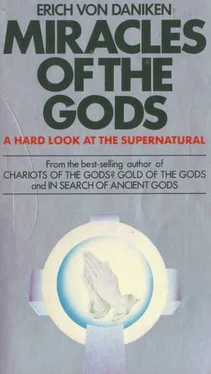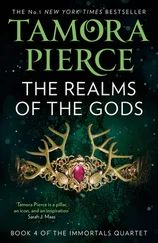Erich Daniken - Miracles of the Gods
Здесь есть возможность читать онлайн «Erich Daniken - Miracles of the Gods» весь текст электронной книги совершенно бесплатно (целиком полную версию без сокращений). В некоторых случаях можно слушать аудио, скачать через торрент в формате fb2 и присутствует краткое содержание. Жанр: Физика, на английском языке. Описание произведения, (предисловие) а так же отзывы посетителей доступны на портале библиотеки ЛибКат.
- Название:Miracles of the Gods
- Автор:
- Жанр:
- Год:неизвестен
- ISBN:нет данных
- Рейтинг книги:4 / 5. Голосов: 1
-
Избранное:Добавить в избранное
- Отзывы:
-
Ваша оценка:
- 80
- 1
- 2
- 3
- 4
- 5
Miracles of the Gods: краткое содержание, описание и аннотация
Предлагаем к чтению аннотацию, описание, краткое содержание или предисловие (зависит от того, что написал сам автор книги «Miracles of the Gods»). Если вы не нашли необходимую информацию о книге — напишите в комментариях, мы постараемся отыскать её.
Miracles of the Gods — читать онлайн бесплатно полную книгу (весь текст) целиком
Ниже представлен текст книги, разбитый по страницам. Система сохранения места последней прочитанной страницы, позволяет с удобством читать онлайн бесплатно книгу «Miracles of the Gods», без необходимости каждый раз заново искать на чём Вы остановились. Поставьте закладку, и сможете в любой момент перейти на страницу, на которой закончили чтение.
Интервал:
Закладка:
The bread for the supper was partly prepared in the form of hosts with the sign of the cross. It is demonstrated that this 'Table of the Lord' was also conceived as a bloodless sacramental renewal of the divine sacrifice. Even the words spoken during the tran-substantiation in the present-day Catholic Mass are essentially prefigured: 'Say seven times; thou art wine; thou art not wine, but the blood of Athena. Thou art wine; thou are not wine, but the blood of Osiris, the bowels of Jao.'
The faithful were reborn through this 'meal of the blessed' and, in contrast to the lost, who could expect a miserable fate, were described as 'redeemed, saved, immortal'. The initiates of the mystery religions became 'children of god' through the meal. God took them into his dwelling; they were united with him. The meal is also to be conceived of as actually sharing a meal with god.
The life of the son of god or the founder of the religion shows striking similarities to the life of Jesus, not only in the mystery religions, but also in the Eastern and Far Eastern pre-Christian religions. This begins already with the prophecies as 'Redeemer and saviour of mankind' (b). For example, the followers of the Zoroastrian religion were also told: 'The world is full of expectation of him: he is the prophet Mazda.' Generally there is an account of the supernatural begetting (c) of the saviour god, with the virgin birth being widely known long before Jesus, for example in the case of Buddha and Zoroaster.
With Buddha the begetting is supposed to have taken place by the penetration of a divine ray into the womb of the virgin mother. Even more striking is the concordance in the descriptions of the birth of the religion's founder (d). Other founders of religion, besides Jesus, were born in a manger, put in a crib and wrapped in swaddling clothes: in other religions, too, the birthplace was lit by a bright light; in the case of other founders of religions, too, heavenly choirs singing praise appeared: even the adoration of the shepherds was not lacking.
After the birth of both Jesus and Krishna (eighth terrestrial apparition of Vishnu, one of the main epiphanies of the divine in Hinduism), the slaying of all newly-born male children was ordered by a jealous king. The presentation of the child in the temple is also attested to. In particular all founders of religion were tempted by the devil (e), mostly in the desert where they were fasting. Here too details tally with the Bible, in that the devil first offers food and then worldly dominion if his victim will submit.
When Buddha was baptized, there was an earthquake and god proclaimed: 'Immortality is discovered.'
(With Jesus ... this is my beloved son...'). A striking similarity can also be observed in the deaths of divine figures who are venerated as universal saviours. When Caesar died, there was talk of a terrible darkness and also of the earth bursting open and the dead returning (f). The resurrection of sons of god who were transformed on this earth, are generally known in antiquity well before Jesus. The Risen Apollonius, a contemporary and a kind of doppelganger of Jesus, appeared to his disciples. The mystery religions and the Egyptian and Babylonian cultures before them knew both the concept 'I am the vine' and the pastoral slogan 'I am the good shepherd' (g). The persecution of the adherents of the mystery religions by the priests of the established religion was just as customary as the persecution of the Christians. The mocking of the suffering of Dionysus is staggeringly like the mocking of Jesus.
Most founders of religions and sons of gods known to the classical and Far Eastern world before Jesus were miracle workers just like Jesus (h). The miracle of the turning of the water into wine has its parallel in the Dionysus legend. The sick are healed, old men become sprightly, the hungry are fed, the blind see, cripples walk, the dumb speak. Cures are performed at a distance, as by Jesus. Those who were healed carry their beds, the sea is calmed, 300,00 people are miraculously fed and there are many other instances.
Peter sinking in the water (the man of little faith) appears already in Buddhism. Buddha called himself
'the truth' like Jesus. Zoroaster also proclaimed that he would 'return with the holy angels'. Lastly Krishna also preached that the world 'could not recognize him' (i).
In conclusion, a number of texts from the holy scriptures of other older religions are here compared with passages from the Bible, especially the Gospels:
Abbreviations:
l C = Christian l B = Buddhism l Hi = Hinduism l M = Mystery religions l T = Taoism l Z = Zoroastrianism
Bible
1.
There is none like thee, Lord (C)
There is none like thee in the world (Hi)
2.
For thine is the kingdom, and the power, and the glory, for ever and ever. Amen (C)
Yours is the dominion and yours is the might, O Mazda (Z)
3.
The crooked shall be made straight (C)
That which is crooked shall be made straight (T)
4.
Unto you is born a Saviour (C)
Unto you this day the Saviour is born. The virgin has given birth; the line increases (M)
5.
Blessed art thou among women (C)
Exalted above all earthly women (the reference is to Buddha's mother) (B)
6.
He that seeth me seeth him that sent me (C)
He who sees me sees the teaching (B)
7.
For God sent not his son into the world to condemn the world; but that the world through him might be saved (C)
For the Logos (Herakles) is not there to harm or to punish, but to save (M)
8.
I am the light of the world This day is (the scripture) fulfilled ... (C)
I am the eye of the world (B)
The time is fulfilled (Assurbanipal)
9.
Go ye therefore, and teach all nations ... teaching them to observe all things whatsoever I have commanded you (C)
That which you have seen of me and learnt from me, that shall you preach to all men (Hi)
10.
Who hath ears to hear, let him hear (C)
He who has ears, let him hear the word and believe (B)
11.
He that seeketh findeth (C)
He who seeks shall find it (the Tao) (T)
12.
No man having put his hand to the plough, and looking back, is fit for the Kingdom of God (C)
For he who is occupied (with the things of this world) is unfit to accept the kingdom (T)
13.
They are all under sin (C)
Sin reigns freely over you (Hi)
14.
Though your sins be as scarlet, they shall be as white as snow (C)
Even it thou art a villain and thy sins surge heavily, the raft of knowledge bears you easily away over every sea of sins (Hi)
15.
If God be for us, who can be against us (C)
We fetch strength from god; who shall be against us? (Z)
16.
And whosoever liveth and believeth in me shall never die (C)
For believe me that he who trusts in me shall never die (Hi)
17.
For your Father knowest what things you have need of, before you ask him (C)
... For I know thy questions and complaints beforehand (Z)
18.
And as you would that men should be to you, do ye also to them likewise (the 'golden rule') (C)
Do not that for which thou blamest thy neighbour (a tenet of all religions)
19.
Thou shalt love thy neighbour as thyself (C)
A man shall love others like himself (MTB)
20.
Blessed are the merciful (C)
He who fights with mercy conquers (T)
21.
Love your enemies, do good to them that hate you - Father, forgive them; for they know not what they do (C)
Even when they tear his body to pieces, the disciple thinks of the liberation of those who rend him and even in thought he does not destroy them (B Hi)
22.
If ye lend to them of whom you hope to receive, what thank have ye? (C)
Читать дальшеИнтервал:
Закладка:
Похожие книги на «Miracles of the Gods»
Представляем Вашему вниманию похожие книги на «Miracles of the Gods» списком для выбора. Мы отобрали схожую по названию и смыслу литературу в надежде предоставить читателям больше вариантов отыскать новые, интересные, ещё непрочитанные произведения.
Обсуждение, отзывы о книге «Miracles of the Gods» и просто собственные мнения читателей. Оставьте ваши комментарии, напишите, что Вы думаете о произведении, его смысле или главных героях. Укажите что конкретно понравилось, а что нет, и почему Вы так считаете.











